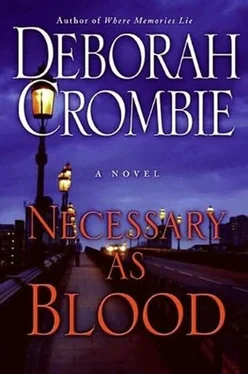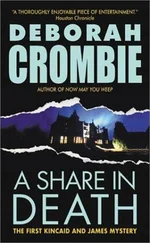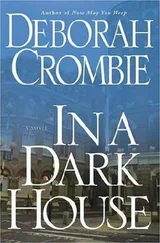“Ooh, they teach you big words in medical school,” Weller retorted, but he knew Rashid was right. “So, you still convinced this guy didn’t top himself?”
Rashid shot him a look. “We’ll see what comes back on the tox. But I still think he was heavily sedated when he died. And if he was that trashed, how did he get himself to the park and onto the trail? He didn’t take anything when he got there-not unless he had a handful of loose pills in his pocket and swallowed them without liquid. I went through his clothes. No pill bottles, no syringes, and the techs didn’t find a drink or a water bottle near the body.”
“I had the SOCOS bag the rubbish in the bin at the park entrance,” said Weller. “We’ll check it for his prints.”
“Well, I suppose he might have got that far,” Kaleem said, going on with his stitching, “but I think you’re reaching for it. If it was a suicide, why dispose of the evidence?”
“Because he didn’t want his daughter to grow up knowing he’d killed himself?”
“He’d have known the drugs would show up on a tox screen, so what would be the point?” asked Kaleem.
“Maybe he thought we’d assume he dropped dead of a heart attack.”
“You said this guy was a lawyer. Give him a bit of credit.”
Weller tried one more time. “You’re sure he didn’t croak from natural causes?”
“No. He was still breathing when he fell. I found bits of dirt and leaf mold in his nostrils. No sign of stroke or aneurysm. A bit thin, as I said earlier, but not enough to cause him any problems. Other than that, your Mr. Malik was healthy as a horse. Except, of course, for the unfortunate fact that he’s dead.” Rashid finished closing the Y incision with a neat knot. He unfolded a sheet over the body, then stripped off his gloves. “I’ll send you the transcribed copy of my report. And you can have the techs pick up the personal effects. I’ve already sent the hair and fiber I gathered off to the lab.”
He glanced at the evidence bag on the cart by the door and frowned. “Could have sworn I put the phone in first.” There was a slim mobile phone near the top of the bag. Rashid shrugged. “Double shift. Too much coffee, not enough sleep.” He fixed Weller with the penetrating stare he usually reserved for the nonresponsive. “So what’s up with you, old man? It’s more than champagne hangover. Why are you so determined to prove this wasn’t murder?”
Weller straightened up, sighed. “Because if Naz Malik was murdered, I suspect it means I screwed up. Big-time. And that means this case is out of my hands.”
…the land which is now Bangladesh was part of India until the partition in 1947, then it was East Pakistan from 1947 until the 1971 war of liberation, which saw the birth of Bangladesh as an independent nation.
– Geoff Dench, Kate Gavron, Michael Young, The New East End: Kinship, Race and Conflict
Another weekend spent finding excuses to come in to work. Worse still, Doug Cullen had even managed to get his guv’nor in on a Sunday afternoon, which hadn’t earned him any scout points. Sitting at his desk in his office at the Yard, Kincaid had pushed the printouts aside, steepled his fingers, given him a look worthy of the chief super, and said, “Just how bored are you, Doug?”
“Don’t know what you mean, guv,” Cullen had said, but he’d colored, knowing full well.
“This report could have waited until tomorrow morning.”
“But I thought if the chief had it first thing…” He’d sounded lame even to himself.
“Get a hobby, Doug. Check out the joys of Facebook or something.” Kincaid stood and stretched. He’d come to the office in T-shirt and jeans, hair rumpled. “I’m going home. And the next time you call me in on a Sunday, it had better be life or death.”
Cullen had stayed for a bit in the empty office, but not even the Yard’s air-conditioning had kept up with the heat of the afternoon. The room was stuffy, and the building had that stale, dregs-of-the-week feel that came with Sunday afternoons. When the janitors came through, he’d switched off the computer and left them to it.
The guv was right, he thought as he rode the stifling tube back to Euston Road. Since his break-up with his ex-girlfriend, she of the hyphenate, Stella Fairchild-Priestly, he’d become a mole. Cullen had always been focused on work-one of the reasons behind the failure of the relationship-but lately he’d become obsessive, and he’d read enough pop psychology to know such single-mindedness wasn’t healthy. Not to mention the fact that he wanted above all to succeed at his job, and pissing off the boss was not the way forward.
But nothing else seemed to motivate him. Social networking was not his cup of tea, although he’d lurked on Internet sites. It was an easy habit to acquire when part of your job was finding out things about other people, but that made him even less likely to want to put information about himself in the public domain.
As the train lurched into Euston Square station, he waited, sweating, as he listened to the carriage creak and groan. He hated the tube, even when it wasn’t sweltering. It occurred to him that he could buy a car and avoid public transport altogether-that would be something new to occupy him for a bit. But then parking near his flat would be a nightmare, and as he often had access to transport pool cars during an investigation, it seemed a pointless expenditure.
He climbed the stairs to the street and walked east, his steps slowing as he neared his building. He hated his flat, a boring gray cube in a boring gray building near Euston Station. Stella had liked to say that he lived on the edge of Bloomsbury, but that was stretching it, in terms of style as well as geography. She’d always wanted to make him sound cooler than he was. Hell, that was an understatement-she’d always wanted to make him cooler than he was.
As part of her “fix Dougie” mission, she’d done the flat up for him in a trendy minimalist style that he’d hated from the first minute. But he’d not wanted to hurt her feelings, and since they’d split, he’d never found the energy or the imagination to change it. He’d bought some nice audio equipment, but Stella had made fun of his music collection so often that he was reluctant to share it with anyone else, and in truth he listened to his iPod most of the time.
And then, after Stella, there had been Maura Bell, the prickly detective from Southwark, and that little interlude had put paid to any remaining self-confidence. He tried not to think about that disaster.
Entering his building, he took the elevator to his floor and unlocked the door. The place was tidy, at least, but roasting. He pulled open the sitting room window as far as it would go, letting in a faint current of exhaust-scented air, then looked round the flat in increasing dismay.
Why did he stay? His lease was coming up for renewal next month, he realized, and he hadn’t yet signed the papers. The flat had been the best he could afford before he’d been promoted to sergeant, but he’d had several pay rises since then. He even had some money in the bank-aside from splashing out on electronics and decent clothes for work, he didn’t spend much, and he’d paid off all his university debt.
An exhilarating sense of freedom swept through him. He could go…anywhere. Someplace nearer work. Someplace near the river, maybe. Kincaid was right, he needed a hobby. He’d rowed at school, and it had been the only athletic thing he’d ever been halfway decent at. Maybe he could find a flat in Fulham or Putney, near the rowing club.
He booted up his computer, then checked the fridge. One beer, but that would do for now. He sat down again and typed in “Flats to Let.”
Читать дальше












